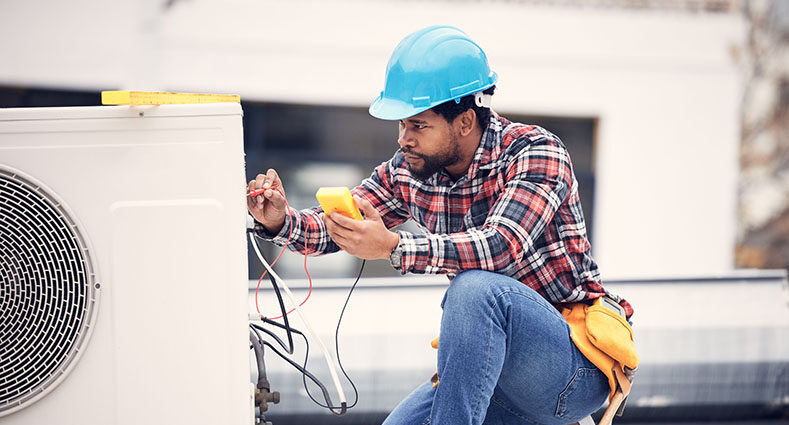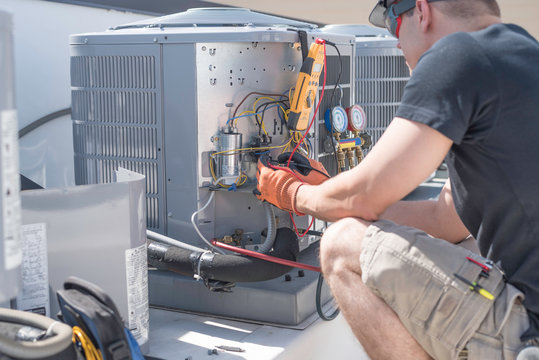AC repairman insights: what they wish you knew
Wiki Article
Everything about HVAC: Identifying Common Issues and Effective A/c Repair Work Methods
Heating and cooling systems are critical for preserving indoor comfort. Recognizing their elements and functionality is important for identifying usual issues. House owners usually face problems such as inadequate cooling, strange smells, or rising energy prices. These signs can suggest underlying concerns that may need interest. Discovering DIY troubleshooting strategies can be useful, but recognizing when to look for expert aid is just as crucial. What steps can be required to assure durable efficiency?Comprehending Your Heating And Cooling System: Parts and Capability
A heating and cooling system, typically considered the backbone of interior climate control, contains numerous key components that collaborate to control temperature and air top quality. The primary elements consist of the heating system, ventilation system, and a/c device. The heating unit, usually a heating system or boiler, generates heat during chillier months, while the cooling system cools down interior areas during the summertime.
Typical A/c Troubles Homeowners Experience
Homeowners often encounter numerous typical cooling and heating problems, including inconsistent temperature level circulation throughout their living areas. Additionally, uncommon noises during procedure can show underlying problems that call for interest. Attending to these problems immediately is essential for preserving perfect system efficiency.Inconsistent Temperature Level Distribution
Many houses experience the irritating issue of irregular temperature level circulation, where certain areas really feel uncomfortably warm while others continue to be as well cold. This trouble typically emerges from a variety of factors, including inadequate insulation, blocked vents, or an incorrectly sized cooling and heating system. When ducts are not properly sealed or when furnishings obstructs air movement, some spaces might receive insufficient air conditioning. In addition, thermostat positioning can substantially influence temperature level law; a thermostat situated in a sunlit area may misstate the general temperature level of your house. Routine upkeep, including cleaning filters and making certain ductwork is clear, can assist relieve these discrepancies. Property owners may additionally take into consideration zoning systems to far better control temperature levels throughout different areas of the home, advertising a more comfy living setting.Unusual Sounds Throughout Operation
When a cooling and heating system operates, uncommon noises can show underlying problems that need interest. Property owners may run into a series of audios, such as grinding, squeaking, or hissing. Grinding noises usually signify worn-out bearings or components, while squeaking can suggest loosened belts or components requiring lubrication. Hissing may show a refrigerant leakage, which can endanger the system's performance. In addition, banging audios may point to loose ductwork or a concern with the blower fan. Each of these noises functions as a warning, triggering property owners to investigate better. Overlooking these indications can cause more significant problems and pricey repair work. Routine upkeep and prompt interest to unusual noises can boost system durability and performance, ensuring a comfy living environment.Indications That Indicate Your A/c Demands Repair Work
How can one inform if their a/c device needs fixing? Numerous signs may indicate underlying issues calling for professional interest. If the Air conditioner fails to cool the room successfully, it might recommend a refrigerant leakage or compressor malfunction. In addition, a rise in power expenses without corresponding usage changes might signify ineffectiveness in the system. Homeowners ought to also be alert to uncommon smells rising from the device, which could suggest mold development or electrical problems. In addition, if the air conditioning often cycles on and off, it may be a sign of a faulty thermostat or various other mechanical problems. Finally, the presence of water pooling around the unit can indicate a stopped up drain line. Identifying these indications early can save time and cash, guaranteeing that the cooling system runs successfully and efficiently.Do It Yourself Troubleshooting Techniques for HVAC Issues
When facing cooling and heating problems, home owners can use several do it yourself troubleshooting strategies to recognize the issue. Trick techniques consist of inspecting thermostat settings, evaluating air filters, and reviewing water drainage problems. These actions can aid determine usual malfunctions prior to seeking professional support.Examining Thermostat Setups
What actions should home owners require to assure their thermostat setups are proper? Initially, they must validate the thermostat is readied to the preferred temperature and setting, whether heating or air conditioning. Examining for a clear display screen and validating air conditioning installers the thermostat is not established to "hold" or "holiday" setting is necessary. Homeowners ought to additionally confirm that the thermostat is level and set up in a location cost-free from drafts, direct sunshine, or other temperature level influences. In addition, recalibrating the thermostat can assist offer accurate analyses. If the thermostat operates on batteries, changing them might resolve any type of issues. By methodically examining these variables, property owners can typically identify and fix thermostat-related problems, advertising suitable a/c system performance.Inspecting Air Filters
Air filters play a necessary function in maintaining optimal HVAC performance. They trap dirt, allergens, and top article other particles, ensuring clean air blood circulation. Gradually, filters can come to be stopped up, reducing airflow and performance. To inspect air filters, people must first find the filter, usually discovered in the return air duct or near the furnace. As soon as situated, they should examine the filter's condition-- if it appears dirty or blemished, it likely requirements substitute. Many filters call for transforming every 1-3 months, relying on use and ecological factors. Routine examination and timely replacement of air filters not only boost air top quality however likewise lengthen the life-span of HVAC systems, avoiding possible breakdowns and pricey fixings.
Reviewing Drain Issues
How can home owners efficiently recognize and resolve drain concerns within their a/c systems? They need to evaluate the condensate drainpipe line for obstructions or clogs, which can lead to water accumulation. Home owners might use a wet/dry vacuum to get rid of any kind of particles blocking the line. Next off, checking the drain frying pan for corrosion or leaks is vital, as a harmed frying pan can create water to overflow. Normal cleansing of the drain line with a combination of vinegar and water assists stop future clogs. Furthermore, ensuring appropriate incline of the drain line advertises effective water flow. If these do it yourself strategies do not solve the problem, speaking with a specialist heating and cooling technician may be needed to avoid prospective water damages and system failing.When to Call an Expert for Air Conditioning Fixings

While some a/c problems can be managed with DIY methods, there are situations where calling an expert ends up being necessary. Homeowners should look for professional help when they come across relentless issues, such as insufficient air conditioning, weird sounds, or uncommon smells rising from the system. These signs and symptoms might show deeper problems that call for specialized understanding and devices to detect and repair properly.

Preventative Maintenance Tips for A/c Long Life
Regular preventative maintenance can substantially enhance the durability of heating and cooling systems. Property owners ought to schedule annual assessments by licensed professionals to assess system efficiency and recognize potential concerns. On a regular basis changing or cleaning air filters is crucial, as this warranties appropriate airflow and minimizes article source stress on the system. Additionally, examining and securing ductwork prevents power loss and enhances total performance.
It is additionally a good idea to keep the exterior device free from particles and greenery, enabling for peak air movement and warmth exchange. Home owners ought to examine the condensate drainpipe for blockages to avoid water damage and mold growth. Maintaining proper thermostat settings and utilizing programmable options can enhance power performance. Ultimately, documenting maintenance activities aids track solution background and can assist in determining persisting concerns (HVAC company). By adhering to these preventative actions, people can make best use of the efficiency and lifespan of their HVAC systems
Often Asked Inquiries
How Commonly Should I Replace My HVAC System Filters?
Heating and cooling system filters should typically be replaced every one to three months, relying on usage, filter kind, and environmental elements. Normal substitute aids keep effectiveness and air quality, making certain peak system efficiency throughout the year.What Size Heating And Cooling System Do I Required for My Home?
To establish the ideal HVAC system size for a home, one must consider square footage, insulation high quality, and local environment. Consulting an expert can assist guarantee optimal efficiency and convenience for the certain living room.Are There Eco-Friendly Heating And Cooling Options Available?
Yes, green HVAC options are offered, consisting of energy-efficient heatpump, solar-powered systems, and geothermal home heating. These choices reduce energy consumption and ecological influence, promoting sustainability while maintaining reliable environment control for property and industrial areas.How Can I Improve My heating and cooling System's Energy Efficiency?
To enhance cooling and heating power effectiveness, one can regularly maintain the system, seal air leakages, mount programmable thermostats, utilize energy-efficient filters, and warranty appropriate insulation throughout the home to lower power intake and boost performance.
What Is the Ordinary Life-span of a HVAC System?
The average life-span of a HVAC system commonly varies from 15 to 25 years, depending upon elements such as maintenance, usage, and the quality of installation. Normal upkeep can substantially extend its operational long life.Final thought
In summary, a thorough understanding of HVAC systems encourages home owners to recognize usual issues and address minor problems properly. Identifying signs of malfunction, employing DIY repairing methods, and prioritizing routine maintenance can enhance system performance and effectiveness. When faced with complex repair services, employing expert aid is important to assure safety and security and long life. By promoting awareness and positive treatment, individuals can delight in a comfy indoor atmosphere while decreasing unforeseen prices associated with HVAC failings.Report this wiki page